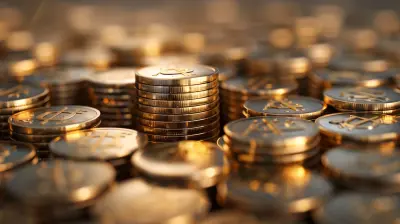How to Identify a Crypto Scam and Protect Your Assets
20 September 2025
Welcome to the wild world of cryptocurrency — where dreams of fast cash and financial freedom often come face to face with shady schemes and slick-talking scammers. If you're diving into the crypto space, it's crucial to know how to protect yourself and your hard-earned money.
With so many people investing in crypto, scammers are working overtime to take advantage of the hype. But don’t worry — by the time you're done with this article, you’ll be able to spot a crypto scam from a mile away and know exactly how to guard your digital wallet.
Why Are Crypto Scams So Common?
Before we dive into how to identify scams, let's get one thing straight — crypto fraud isn’t happening by accident. The crypto market is still young, largely unregulated, and incredibly fast-paced. That’s like the perfect playground for criminals. Combine that with FOMO (fear of missing out), and you’ve got yourself a scammer’s paradise.No middlemen. No banks. Just you, your wallet, and the blockchain. But that freedom? It comes with a price: personal responsibility. You’ve got to be your own watchdog.
The Most Common Types of Crypto Scams
Scams come in all shapes and sizes. Some are bold, others are subtle. But they all have one thing in common — they’re trying to steal your money. Let’s break down the most popular ones:1. Phishing Attacks
You know those emails that say, "Urgent! Your account is at risk!" and ask you to click a suspicious link? Yeah, those exist in crypto too — and they're just as sneaky.Phishing in the crypto world often targets your private keys or wallet login details. Once they have those, game over. That's like handing a burglar the keys to your house.
> Rule of thumb: Never, ever share your seed phrase or private keys. Not even with your dog.
2. Pump and Dump Schemes
These are the OG scams of the stock market, now doing just fine in the crypto world. Here’s how it works:- A group hypes up a low-market-cap coin.
- Investors rush to buy it, driving up the price.
- The promoters sell their holdings for a fat profit.
- Everyone else is left holding the bag.
If you see a coin exploding in value out of nowhere and social media is going nuts, odds are it's a pump-and-dump.
3. Rug Pulls
This one’s brutal. Imagine you put your money into a new crypto project or DeFi platform. Everything looks good. Then boom — the developers vanish, along with your money. They literally "pull the rug" from under you.Red flags include anonymous developers, no audit reports, or promises of insane returns.
4. Fake Crypto Exchanges and Wallets
Scammers can build fake apps that look just like legit crypto wallets or exchanges. You enter your info and — poof — your funds disappear.Always double-check for app authenticity. Stick to official websites or trusted app stores.
5. Impersonation Scams
Scammers love to impersonate big names. Elon Musk giveaways, fake Binance support teams, or even your favorite crypto influencer. If someone DMs you offering free crypto or "insider tips," it's almost always a scam.> If it sounds too good to be true, it is.
How to Spot a Crypto Scam: Warning Signs
So how do you know it's a scam? Here are some dead giveaways:❌ Unrealistic Promises
If someone guarantees massive gains with zero risk — run. Crypto is volatile. No one can promise risk-free profits.❌ Pressure Tactics
Scammers love to rush you. “Limited-time offer!” “Buy now before it's gone!” High-pressure tactics are a big red flag.❌ Anonymous Founders or Teams
Would you invest in a business with no idea who’s running it? Always check for transparency. Look them up on LinkedIn, Twitter, or GitHub. No online footprint? Major red flag.❌ No Whitepaper or Roadmap
Legit projects have detailed whitepapers explaining their tech and goals. If that’s missing or filled with buzzwords and fluff? Sketchy.❌ No Audit Reports
In DeFi, audit reports are like third-party quality checks. A lack of them is like buying a car without checking the brakes.❌ Suspicious URLs or Misspellings
Scammers often replicate legit websites with minor tweaks to trick you. Always double-check the URL. Bookmark trusted sites.
How to Protect Your Crypto Assets
Now that you can smell a scam a mile away, let’s talk about keeping your crypto safe. Because identifying scams is just half the battle.✅ Use Reputable Wallets and Exchanges
Choose wallets and exchanges with a solid reputation. Look for platforms that offer two-factor authentication (2FA), biometric login, and allow you full control of your private keys.Popular options like Coinbase, Binance, Ledger, and MetaMask have earned users' trust for a reason.
✅ Turn on 2FA Everywhere
Two-factor authentication is like adding a second lock to your door. Most platforms support it — use it.And no, SMS isn't the safest choice. Go with an authenticator app like Google Authenticator or Authy.
✅ Store Keys Offline (Cold Storage)
Hot wallets (those connected to the internet) are convenient but riskier. For serious holdings, get a hardware wallet (cold wallet) like Ledger or Trezor. Like keeping your gold in a safe, not under the mattress.✅ Regularly Monitor Your Accounts
Stay vigilant. Check your transaction history regularly. Enable alerts for logins and transfers.Even better — set up a watch address using tools like Etherscan or BSCScan to monitor any movement from your wallet in real-time.
✅ Educate Yourself Continuously
Scams evolve fast. What worked last year may not apply today. Follow crypto security channels, Reddit threads, and blogs. Knowledge is your best shield.What to Do If You Fall for a Crypto Scam
Let’s be real — stuff happens. The crypto space is confusing, and scammers are getting slicker. If you think you’ve been hit, don’t panic. Act fast:1. Stop further transactions immediately.
2. Transfer remaining assets to a safe wallet.
3. Report the scam to the exchange, wallet provider, and local authorities.
4. Use websites like Chainabuse.com or the FTC to file a report.
5. Alert the community — post about it on forums like Reddit, Discord, or Twitter.
And yep, take it as a learning moment. Most people get burned once. The smart ones don’t let it happen again.
Bonus Tips for Staying Safe in Crypto
Here's a quick checklist to keep on hand:- 🔒 Never share your private key or seed phrase
- 🛑 Ignore unsolicited DMs or messages offering “help”
- 🤖 Don't trust bots impersonating crypto personalities
- 📚 Research before investing in any coin or project
- 👀 Watch out for fake giveaways (no one gives out free ETH)
Think of crypto security like a seatbelt — you might not need it every time, but when you do, it could save you.
Final Thoughts
Navigating the crypto world is like walking through a digital jungle. There are some amazing opportunities — but also predators hiding in the brush. If you stay alert, question everything, and make security a habit, you’ll be just fine.Remember, there’s no customer service desk in crypto. You are your last line of defense. With a little caution and common sense, you can keep your assets safe and enjoy the ride.
So, the next time someone promises to double your Bitcoin overnight or slide into your DMs with a "no-risk investment," you’ll know exactly what to do — run the other way!
all images in this post were generated using AI tools
Category:
CryptocurrencyAuthor:

Zavier Larsen
Discussion
rate this article
1 comments
Elwynn McDougal
Great read! Remember, staying informed is your best defense. With a little caution and research, you can navigate the crypto world safely. Happy investing! 🚀
September 24, 2025 at 2:52 AM

Zavier Larsen
Thank you! Staying informed is indeed crucial for safe investing in crypto. Happy investing to you too! 🚀


